Free Download: "7 Ways You're Making Your Hauler Rich!"
Let me share a little secret with you: you’re almost certainly overpaying your waste hauler.
The industry isn’t designed to help you save. It’s designed to help your haulers make more and more money off you. In the past 20 years we’ve been in business, it’s something we’ve seen again and again.
So we distilled the most common way people overpay in this handy download, which can be yours for free with the click of a button!
Stop making the same waste mistakes over and over - for good!
Medical Waste Invoices: The Good, the Bad, and the Ugly
Investing time in monitoring your invoices can yield savings - a lot of savings.
In this article, you’ll learn how to see the hidden problems on your medical waste invoices. This can be daunting, but you can use this information to your advantage: these problems actually point to savings opportunities!
Medical Waste Invoice Line Items
Your medical waste invoices should be itemized so you can see exactly what you’re paying for. Invoices that list one lump sum obscure your rates.
Take a look at the invoice below - it has the fuel, energy, and disposal fees listed. It also includes a late fee.
Take a look at the invoice below - it has the fuel, energy, and disposal fees listed. It also includes a late fee.
One of the first things we review for our new clients is their medical waste invoice history. Itemized invoices make it easy to see when your rates increase and which fees increase. Maybe your fuel fees stay static, but the energy charge goes through the roof. Or maybe your late fees suddenly start increasing.
If you don’t have an itemized invoice, you won’t know what fees have changed and which remain the same. This becomes critical for our clients because the medical disposal service contracts we negotiate always contain language that eliminates or caps these fees at a certain rate. If we can’t see the fees, we don’t know if the hauler is charging according to the specifications in the contract.
We make sure that our clients’ invoices are transparent and that their contracts protect their interests - and their bottom line! Are you a good candidate for a waste audit - and invoice monitoring?
How Invoices Help Us Hold Waste Vendors Accountable
Invoices can give us a baseline for price expectations and point to contract gaps.
Base service rates: Your invoices will show your rate for your services - but it won’t show how much those rates have increased in the past six months. To find that, we look at your contract and your invoices history. The rate specified in your contract shows what you should pay each month for your services. But what’s not in your contract actually tells us more than what is. If you don’t have language prohibiting price spikes, we know you’re almost always going to get them. If you don’t have terms capping rate increases over the term of your contract, your base rates are going to rise. We quickly remedy these gaps in coverage for our clients when they sign up for a waste audit!
Most vendors will increase rates at least once a year, which means that over the term of your contract your rates can increases more than 100%! Is your contract protecting you from these?
Billing discrepancies: We review every one of our clients waste invoices for every location in their portfolio. So if the disposal fee jumps a few hundred dollars, we’ll see it and get the necessary billing credits on your behalf. We find invoice errors occur 10% of the time - are you and your staff catching them?
When you sign up for a free medical audit, you’re putting our industry expertise to work for you. We find where you’re being overcharged, and we find the solutions that are right for you, your locations, and your industry.
Medical waste invoices can show where you’re overspending
Invoices can give us a baseline for price expectations and point to contract gaps.
Benchline red bag disposal pricing: These fees give us an idea of what you should pay each month for each of these categories. If the disposal fee jumps a few hundred dollars, you’ll know that’s abnormal - if we’re paying attention to the monthly invoices.
And if you’re familiar with your invoices, you’ll know when errors happen. (We estimate that invoice errors occur 10% of the time - and can sometimes be incredibly costly.)
Waste contract gaps: If you notice that you’re consistently getting price hikes, or that your fuel charges suspiciously increase every few months, you need to take a good look at your contract.
Another way to prevent price hikes? Make sure your contract is airtight; make sure it does not allow disposal companies to increase their hikes over a certain percentage.
This is part of the reason offer monthly invoice monitoring. Medical disposal companies are notorious for randomly jacking up their disposal fees - just like waste disposal companies!
Do these vendors charge for their services? Absolutely. They provide a vital service, and there are a lot of valid services that are legitimately billable. But that doesn’t mean you should be overcharged.
Safety and savings are not mutually exclusive when it comes to medical waste disposal.
What do your invoices show you?
Take some time to go over the last six months of your invoices and ask these questions:
Are my disposal fees steady? Or is there a rate increase?
Are there charges I can’t explain?
Do my prices reflect market costs?
Familiarizing yourself with your invoices can tremendously impact your bottom line.
Short on time? You’re probably a great candidate for a professional medical waste audit.
Our professional, exhaustive audits will find every savings opportunity available to you - and they’re guaranteed cash-flow positive!
What questions do you have about medical waste disposal management? Sound off in the comments below!
Free Access: Mini E-Course, "Your 5 Hidden Waste Problems"
When was the last time you heard someone complain about their waste contract? Probably never, right?
This is because most people don’t see the waste problems right under their own nose.
They don’t know they have hidden waste problems - and chances are that you’re one of them.
This is exactly why we created this free mini course. We spell out exactly what you should look for to save.
Check out the first video of the series below!
These issues can steal thousands of dollars from your bottom line, but they can absolutely be prevented.
This course is the first of its kind and is designed for busy professionals who want to save on their company’s waste expenses.
Why this free course is necessary
90% of companies nationwide are overspending on waste by 10-30% every month. Why? Because they don’t know how they’re overspending.
Not many people have the time or expertise to carefully review their waste and recycling contracts before they sign them. You have more important things to do during your day, right?
And even fewer people know what to look for on those contracts - and when they’re hiring a hauler, or renegotiating a current contract.
But there’s another reason these problems are hidden. It’s because most haulers are not going out of their way to charge fairly and set up honest contracts. Haulers are out to make a profit, and they will sometimes go to extremes to ensure they retain your business.
In the course, we talk about how having automatic renewal clauses makes it difficult for you to change vendors. We talk about how not capping price hikes will make you overpay. We talk about how you actually aren’t required to pay ancillary fees.
We take a behind the scenes look at how haulers try to pull fast ones. And we show you what you can do about it.
How this course is delivered
One section of this 7-part course is delivered to your email inbox every three days. At the end of the course, you’ll receive a link with access to all of the videos and additional PDFs so that you can easily and permanently access the course.
This course is:
Easy. We break down concepts and make it clear how each problem can impact your bottom line.
Convenient. We’ll email you once every three days, so you can view the videos at your convenience. No rush, and no deadlines.
Completely free. We’ve distilled 18 years of waste experience in this course and you can access it all for free.
And if you sign up right now, we’ll include an additional free PDF with even more savings tips!
Click here to sign up >>
Medical Waste Disposal 101: How It's Done
Learn exactly what happens to your medical waste - and the pros and cons of different processes!
Maybe you’re not sure what exactly happens to your medical waste. Or maybe you just want to make sure that you’re handling yours in the safest way possible.
Put those concerns to rest! In this article, I’ll guide you through the ins and outs of the red bag waste disposal process.
Not sure what medical waste is?
Let’s look at how medical disposal is sanitized and disposed of and how often it’s typically picked up.
At the end of this article, you’ll know exactly what happens to your medical waste - and the pros and cons of different processes!
The Medical Waste Disposal Process
Medical waste must be picked up from your site by a licensed biohazard waste hauler. They take it to a special facility where they first sanitize the waste so that it can then be disposed of. This sanitization process happens through either autoclave or through incineration.
Incineration is exactly what it sounds like - it burns the waste products. Unfortunately this process produces gases that some companies have released directly back into the environment, which is less than ideal. It also creates ashes, which often can’t just be thrown out with regular waste. More medical waste tends to be neutralized through autoclave, but particularly dangerous materials tend to be incinerated.
Autoclave is more expensive, but it’s more efficient - and, some would argue, safer. All the medical waste goes in a drum that is then pressurized and heated. This process kills germs and micro-organism, and the waste becomes like any other trash - it’s safe to throw it away or recycle it.
Scheduling Services for Medical Waste
When it comes to scheduling, there are some ways in which medical waste is a lot like other waste: if you have lots of it, schedule more frequent pick-ups.
But unlike regular trash, medical waste can pose health hazards if too much time goes by between pickups. (Don’t believe your mom - regular trash get smelly if it’s not taken out, but it’s not likely to kill anyone!)
Some kinds of red bag waste can damage human tissue - or it might be radioactive. Suffice to say, you don’t want to just leave this type of material lying around for too long.
If anything, it’s best to err on the side of too many pick-ups. This isn’t the kind of waste you want to handle haphazardly.
Make Sure Your Medical Waste Disposal Is Safe
We help companies safely handle their red bag waste - but we also make sure they pay fair prices. None of the processes we’ve described above are wildly expensive. Yet medical waste bills can be exorbitant.
Why not schedule a free consult? It’s the perfect way to find savings - and ensure the safety of all those who visit, work, or live at your locations.
Evaluate Your Current Medical Waste Management Process
Medical waste disposal is a highly regulated process and it ensures the safety of those on your site, as well as those who handle the waste.
To make sure your medical waste management process is airtight, do these three things:
Make sure your team is properly trained (or retrained) in waste disposal techniques!
Schedule frequent pick-ups.
Make sure that all waste materials make it into the designated containers.
You can rest easy knowing that you’re doing everything you can to ensure that dangerous materials are disposed of safely and effectively.
What questions do you have about the medical waste disposal process? Sound off below!
Free Full-Length Download: How to Save on Waste Expenses
Tired of overpaying on your waste expenses?
We’ve compiled a complete resource to show you how to stop.
Simply click below to download.
This download covers:
Evaluating your waste process
Everything you need to know about your waste contracts
How to fix your contracts
Next steps forward to keep saving
We’ve distilled our 20+ years of helping clients save on waste to give you all the resources you need to evaluate your own - and save!
Medical Waste Disposal 101: What is it?
To ensure safe disposal of your medical waste, it’s critical to learn what it is.
Medical waste or red bag waste is a critical part of your overall waste management process. It often involves hazardous materials that must be disposed of with care.
In an effort to protect theirs residents, visitors and/or staff, at least 50% of companies nationwide are overpaying on their medical waste disposal. You don’t have to be one of them.
You can have high-quality medical waste disposal service at a reasonable rate - do you? How would you know if you were overpaying?
In this article, we’ll go over the basics of medical waste disposal:
What it is
How it’s disposed of
Your expensive, hidden problems
How you can save on these services
You’ll also learn about just a few of the potential savings opportunities you may be sitting on - and how to take advantage of them. As we’ll see, medical waste safety and savings can go hand in hand.
What is medical waste?
Medical waste is anything that could contaminate blood borne pathogens. (See a full list here.) But this doesn’t necessarily mean anything that’s been in contact with blood! To be considered medical waste, materials have to “contain enough blood or potentially infectious materials” to be hazardous to those who may come into contact with it.
Band-aids, for example, aren’t usually considered medical waste. Gauze covering a gash on an arm? That’s a different story!
Medical waste exclusively comprise items and materials that contain or are saturated with blood or other infectious materials. Medical waste isn’t only sharps or needles!
When waste items fit this description, it becomes what’s known as regulated medical waste. Regulated medical waste simply means that certain rules apply to the disposal process to ensure that no person is exposed to potentially hazardous materials.
It’s important to note that different states may have slightly different ways of referring to medical or red bag waste:
New York and Rhode Island refer to it as “regulated medical waste”
Colorado, Nebraska, and Nevada all typically refer to it as “infectious waste”
Connecticut, Florida, Georgia, Maine and Washington State refer to it as “biomedical waste”
Keep in mind that addition medical waste can also be referred to as hazardous waste.
There’s no other way to say it; medical waste is gross - but that’s exactly why it’s critical to ensure that medical waste is disposed of safely and efficiently. We can’t overstate the importance of having secure waste disposal methods!
Who produces medical waste?
A wide range of industries produce regulated medical waste. The EPA notes that such industries may include:
Health care facilities, such as hospitals, clinics, physician's offices, dental practices, blood banks, and veterinary hospitals/clinics, as well as medical research facilities and laboratories.
Hospitals alone produce more than 5 million tons of waste each year, or about 30 pounds of waste per bed each day.
In our experience, many assisted living and retirement facilities often produce medical waste as well. But tattoo parlors and labs can also produce waste that falls in this category.
How is medical waste regulated?
Surprisingly, the federal government does not supply regulations for proper red bag waste disposal - the states do.
Individual states often require that you register as a medical waste generator. These are:
Alabama
California
Delaware
District of Columbia
Florida
Maine
Michigan
New Jersey
New York - NYC
Ohio
Pennsylvania - Philadelphia
Rhode Island
South Carolina
Washington
West Virginia
Find your specific state regulations here!
Why is proper medical waste disposal important?
Proper disposal of any medical waste containers is absolutely critical. 5.2 million people worldwide die from conditions related to poor medical waste disposal - and this could be completely eradicated with proper procedures in place!
Do your part to ensure that medical waste is safely and effectively disposed of. You are protecting the lives of everyone who enters your facilities. Learn more about how to protect your staff and your visitors with a thorough medical waste audit.
What concerns do you have about red bag waste? Let us know in the comments below!
Want to save on your waste? Watch this free video!
You want to save on your waste spend.
But it can be really intimidating to know where to start. What should you evaluate first? How should you prepare the site? What kind of team do you need in place?
We cover all that and more in our course, The Waste Review Blueprint.
Today, we’re making the first video of this course completely free! Click below to watch!
What did you learn from this video? Let us know in the comments below.
What we don't do { + Infographic}
We hold a unique niche in the industry, so there can be confusion about who we are and what we do.
To that end, here are a few examples of what we don’t do!
Free Download: "7 Ways You're Making Your Hauler Rich!"
Let me share a little secret with you: you’re almost certainly overpaying your waste hauler.
The industry isn’t designed to help you save. It’s designed to help your haulers make more and more money off you. In the past 20 years we’ve been in business, it’s something we’ve seen again and again.
So we distilled the most common way people overpay in this handy download, which can be yours for free with the click of a button!
Stop making the same waste mistakes over and over - for good!
What We Don't Do - Part 2
As waste consultants, our process is different from waste haulers or waste brokers. We believe we’ve created an audit and savings process that puts your interests first.
We don’t:
“Estimate” your waste needs.
Leave your savings unprotected.
Perform waste services.
Why? Because they are not ultimately in line with your interests. As a third-party auditor, it’s our responsibility not only to find the savings you’re sitting on, but to prevent future waste and recycling issues. Doing any one of these interferes with both of these objectives. It’s our goal to protect your interests - not undercut them.
We don’t “estimate” your waste disposal and recycling needs.
We don’t just give your waste needs our “best guess” and move on.
Our waste audits take a minimum of two months. Why? Because you deserve to take advantage of every savings opportunity available to you.
Not most of those savings opportunities. Not many of them. All of them.
We don’t do perfunctory audits - we dig deep. We record all service information and perform history audits for every piece of equipment that is over 8yds long. We look for and record price fluctuation, increases, and fees.
Then we analyze:
where you’re overspending
what equipment is working and not working
identifies gaps in your service
Where there may be opportunities to introduce technology
the best way you can stop overspending.
Regardless of whether you have 1 location or 100 locations, we will look at every nuance to make sure no savings opportunities slip through the cracks.
90% of companies are sitting on hidden savings. How much are you sitting on?
We don’t leave your savings unprotected
After our initial audit is complete, we implement all recommended savings opportunities. We may make equipment switches or service changes that benefit your bottom line immediately or longterm. We may also adjust your service levels so they’re efficient. When the changes have been made and all transitions are complete, the savings show up on your invoices. Typically, we are able to decrease your annual waste and recycling spend by 10-35%.
It would be pointless to achieve these savings and then not protect them.
Accountability protects savings.
Most haulers are out to make a buck. They know that most people don’t care about what they pay for waste. They know that most companies will pay whatever they charge for waste services.
Haulers are rarely held accountable. As a result, you’ll likely have price hikes several times a year, and you’ll pay ridiculous ancillary fees, and you’ll have very little recourse when pick-ups are consistently missed.
This isn’t sustainable. So we provide the much-needed accountability haulers need to charge you fairly. We ensure our hauler contracts prohibit or cap price spikes, auto-renewal clauses, and terms longer than 3 years - among other specifications. So if your hauler raises prices, we can point to the contract provisions and insist on billing credits. Our contracts allow us to hold your haulers accountable for their billing practices and service quality.
We’re invested in protecting your savings.
We audit your waste invoices going forward. Vendors make mistakes 10% of the time - and some of them aren’t small.
As an independent third party, we painstakingly monitor your invoices to make sure that service is being provided as specified in your service agreement.
And as an added bonus, we take on all the service issues you may have on site. You and your staff have enough to do, so you can leave service concerns to the experts.
Both of these on-going services protect your time. As waste experts, we are efficient billing auditors because we know where to look for mistakes - and how to get billing credits when necessary. Likewise, we resolve service issues for you. Here are some service issues that we’ve taken care of for our clients in the past few months:
Moving the waste and recycling dumpster to the corral from the parking lot
Increasing pick-up due to higher trash production
Coordinating the transition of a new hauler
Calling and sending reminders to a hauler who would consistently “forget” to service a compactor.
Most service issues aren’t particularly difficult or challenging, they just take time. We ease this burden for your staff, who almost always have other priorities to attend to.
Every so often, we have a major service issue that needs resolution. Earlier last year, a client in North Carolina had a valet vendor that had multiple service failures. They kept losing the compactor key and forgot to service entire floors. They also dragged garbage through the hallways, leaving unsightly smells and trails of garbage residue. At our request, the company gave our client a refund, which was the right thing to do. But the situation didn’t end there.
The issues didn’t stop, and after several turnovers of valet porters, we knew we had to terminate service. We had included a service provision clause for this express purpose. If your vendors consistently don’t perform, you need to be able to exit the contract without paying any kind of fee. Because we were looking out for our client, this clause was included in their contract.
In the end, this client terminated without penalty and had a new provider with a better track record of performance by the end of the week.
We have the time and expertise to find and fight billing errors and to permanently resolve waste, recycling, and valet service issues.
We don’t perform waste services
We are waste and recycling solutions providers - auditors. We are experts in waste streams and invoice analysis, but we are not waste haulers.
We don’t own any dump trucks or waste equipment; you’ll never see us on your site lugging garbage around. We coordinate all these services on your behalf, but we don’t provide the services ourselves.
We pride ourselves on being independent, third-party auditors. This allows us to objectively look at your waste streams and find solutions that will yield savings. If we were haulers, we wouldn’t have the incentive to find solutions that would reduce your waste expenses - ultimately costing haulers revenue in the process.
Because we’re not haulers, we aren’t paid based on how frequently we service your site or how many pieces of waste equipment you’re renting from us. We aren’t monetarily incentivized to over-service the locations in your portfolio. We’re paid based on the actual savings we provide for you.
Our waste and recycling audit services protect your interests.
We protect your time and your bottom line.
To provide you the very best service, we are thorough, we monitor hauler’s invoices and resolve service issues, and we remain an independent voice in the waste industry.
Learn more about what we do - and why our audits have such a high success rate.
5 Reasons You're the Perfect Candidate for a Utility Audit {Infographic}
Wanting to reduce your recurring expenses, but not sure how? A utility audit may be exactly what you need to start saving on your utilities!
Utility audits are a unique opportunity for a professional to review your utility expenses. When we do our audits, we thoroughly look over your invoices and contracts to find ways to save. We also evaluate tax brackets to ensure you’re paying what you should - and not paying for what you shouldn’t.
Below, you’ll find some helpful ways to evaluate if you’re a candidate for this kind of opportunity.
Everything You Need to Know About Valet Trash Services
You’re overpaying on your waste by up to 30%, and you don’t have to. In the 18 years we’ve been in business, we’ve found savings for multifamily complexes over 90% of the time. Translation? You’re likely sitting on thousands of dollars worth of savings.
This article will show you how exactly you’re overspending, and how you can start saving. We’ll go over:
What are valet services?
How you’re overpaying on them
How to stop overpaying
The more you know about your hidden valet problems, the better equipped you’ll be to find cost-cutting solutions.
What is Trash Valet Service?
Valet services are doorstep trash pick-up. Residents in a multi-family complex leave their trash in a receptacle outside their door, and a valet employee removes and disposes of it.
Different locations will have different frequency needs. Some will only offer valet waste once a week; others offer it every day during the week.
Most vendors will service your location at night so that your residents aren’t disturbed - and so they have time to place their trash outside their door.
These services have become increasingly popular in the last decade. Taking the trash out isn’t something most people enjoy, so valet services are a valuable added amenity for residents.
How You’re Overcharged for Valet Waste Services
When we complete a waste audit for a multifamily complex, we find the answers to these questions about their valet waste services:
Are their contract terms longer than three years?
Are there price caps on the contract?
Are there no provisions for poor service?
Does the base rate include additional fees?
Is pricing unprotected for the first year of the contract?
Are there other vendors that could provide less expensive service?
Does the current vendor provide unreliable service?
If the answer to any of these questions is yes, you’re likely overpaying on your waste services. Below, we’ll go over how in detail.
Valet Waste Disposal Contract Terms
If your terms are longer than three years, you have fewer opportunities to review other area pricing. We limit all client contracts to three years instead of the more typical length of five years. Suppose you’re paying $12 per door for five days a week service on a unit with 100 doors. That means that each week, you’re paying a base rate of $1200, or $4800 every month. Over the course of a five-year contract, you’ll pay $288,000.
But suppose you have a three year contract, and you partner with us right before that contract ends. The first thing we would do is terminate the auto-renewal clause, which lets us keep your current provider while looking for better pricing options in your area. Then, we’d get a few bids from service providers. Let’s assume we find one that provides a rate of two dollars less per door - $10. For the three year contract with the cheaper vendor, you’ll pay $144,000, or $4000 each month.
If you were stuck in a five year contract and not able to sign a new three-year contract with the new vendor, you’d overpay by $115,200! In other words, you’d be stuck at the rate of $4800 every month. And instead of being able to switch to the new provider, you’d be forced to pay $57, 600 each year for an additional two years!
The bottom line? Shorter term on contracts means we have more opportunities to find savings. It gives us the chance to make sure your rates are equitable, and it minimizes your odds of overpaying. (This is also true for your waste contracts as well!)
Are there price caps on the contract?
Providers often overcharge you because they can. Many multi-family management companies don’t evaluate the valet invoices they receive, or they just don’t know how to ensure their contract is in their best interest.
Rates can increase as much as 1-2 times a year! Every so often, you’ll see an uptick in the rates listed on your invoice. It can be as little as 5%, but it can also be much more. But even a 5% increase compacts over time! If you’re charged an extra $20 each month during a five year contract, you’ll overpay by $1200!
We recently worked with a multifamily developer/manager who offered valet services at their properties. The WCI Project Manager noticed that the price per unit seemed to be awfully high. We were able to introduce a new vendor who was able to save them $28,800 every year at just 3 properties!
Are there no provisions for poor service?
If your valet services suddenly start missing days of service, you need recourse. There must be consequences in place in your contract if your provider consistently does not provide quality service.
If you don’t have a provision for poor service in your service agreement, you’re leaving yourself open to persistently unresolved issues. You need to know that if your provider consistently misses entire floors or forgets to run the compactor, you can terminate the contract with no penalty. If you don’t have this clause, you’ll likely have to pay a contract buyout in order to end the contract, which usually entails paying several thousands of dollars.
Having this provision in your contract will save you this buyout fee, so it’s absolutely critical to have it.
Does the base rate include additional fees?
Many service providers will tack on additional fees that have little or nothing to do with the actual cost of service. If your contract doesn’t specify that these fees are prohibited, they can charge you for them.
Some additional fees might include an administrative fee, or an overage fee.
Is pricing unprotected for the first year of the contract?
This is another way to protect you and your residents from unexpected price hikes. You can dictate when and by how much the vendor can increase prices.
We expect that service rates will rise over time, but we also know vendor’s proclivity to raise prices as they see fit. As a result, we will ensure our clients’ base rate stays the same for the first 12 months of a contract and is then capped at a certain percentage for years two and three. This allows our clients to budget with incredible accuracy. You’ll know when to expect price increases and by how much every year.
Are there other vendors that could provide less expensive service?
If your rates are too high, you may be getting overpriced services. You could likely be getting the same services for less - in some cases, much less! When we recommend switching valet services, we calculate your contract buyout fee versus the amount you’ll save with a cheaper service.
Because we’ve been in the waste industry so long, we have relationship capital with vendors who price their service fairly and provide high-quality service. We know who the best service choice will be based on your location and your unique needs. We do all the heavy lifting of getting bids and evaluate option - and not just during your initial contract bid. We do this repeatedly, prior to every valet contract’s expiration. So we know for sure that you’re always getting the very best pricing available to you. Not just right now, but for the duration of your partnership with us.
Does the current vendor provide unreliable service?
If your current vendor is truly awful, their services are not worth your time or money. If they have great rates, but their porters consistently “forgets” to service entire buildings, that’s a problem. If they repeatedly leave a trail of garbage down the halls, that’s also unacceptable. (Both of these things have happened to our clients). When these issues happen time and time again, you’re effectively overpaying your vendor because you’re paying them twice. First, you’re paying them for their sub-par services. But you’re also paying your staff to handle the steady stream of complaints this vendor is eliciting. No company’s service is worth that.
As industry experts, we take over all service issues on behalf of our clients. We document as need be and get resolution for each and every issue that arises. We often prove to be much more effective advocates because of our industry knowledge. We know who to talk to, and how to hold vendors accountable to contract specifics. With us, service issues are one less thing for you and your staff to worry about.
How to Reduce Valet Service Expenses
Simply put: without professional oversight of your waste management, you’ll likely overspend. But you don’t have to. Our clients have found reliable solutions and consistent savings after partnering with us, and you can too.
You need a waste ally to proactively prevent valet issues and overspending and protect your savings. What you don’t know is costing you.
You’re likely being charged at rates that are too high because your contract ensures that your rates will steadily increase, unchecked. You may have the most expensive service provider in town, and you may be locked into a contract that has truly terrible terms. Can you afford not to know for sure how much you’re overpaying?
Sign up for a free consultation to talk about your options!
3 Steps to Getting an Airtight Contract (Infographic)
Why bother with making sure your valet contract is airtight?
Because you deserve to not overpay.
Unfortunately, the vast majority of valet contracts don’t include key clauses that prevent price hikes or poor service. If you don’t have those clauses, you’ll pay more than you need.
Take a look below to learn how to make sure your valet contract protects you and your resources.
What We Don't Do - Part 1
What we do is pretty unique - we are independent waste auditors that find every savings opportunity you’re sitting on.
We do this through our audits, a remote, detailed analysis of your waste and recycling processes.
But there are some important things we don’t do as waste consultants. We’ve made deliberate decisions to offer services that benefit you and your bottom line.
This is why we don’t:
Obscure our pricing.
Pay vendor bills on your behalf.
Not doing these things ensures no surprises on your end. We don’t believe in being anything less than transparent, whether it comes to our rates, our billing practices, or our services.
We don’t obscure our pricing.
We bill for 50% of the savings we find for you.
If we find $12,000 in savings every month (as we did for an Atlanta-based commercial real estate management company this past February), you’ll owe us $6,000 each month, and you’ll keep $6,000. Simple as that.
This means that our services are not an added business expense or line item. You pay us exclusively out of the savings we find for you - our process is cash-flow positive.
This method of pricing motivates us to find your maximum savings opportunities. It’s part of what makes our audit process so thorough. We’re not going to easily overlook potential cost-cutting solutions if we know it will hurt our compensation! We find that this pricing method actually serves your best interests: more savings are found when we have a stake in the game.
We don’t get paid unless we benefit you and your bottom line. If you paid us upfront, it would not only be an added business expense for you, but we would not be as motivated to find savings.
If we don’t find any savings opportunities for you, you don’t owe us anything. After all, why pay for a service if you don’t directly benefit from it?
We don’t pay hauler invoices on your behalf.
We don’t ever pay your waste hauler, utility, or telecom bills on your behalf. We’re not waste brokers - we think you should see your bills and know what you’re paying for. Brokers and some consultants will often package waste hauler bills and their own fees in one tidy little bill. It can be convenient for larger companies that don’t want the hassle of keeping track of multiple invoices for their many locations.
But it can obscure what exactly you’re paying for. You get one bill from the broker that will likely only have one amount listed. This amount is conglomerate of services at all properties, and will also typically include his broker fee. This method provides you no transparency. You have to rely on your broker and trust that he is being honest with you.
Suppose your broker hands you an invoice that is 30% larger than last month’s invoice. Your broker may tell you that waste hauler fees have gone up, or that you had a standard price hike at two locations. (Brokers are not financially motivated to negotiate contracts that are in your best interest. They may choose to do so - but they may not.) But in reality, your broker may have decided that his fees should increase. Obscuring what you are being charged opens the possibility for unfair spikes and charges to occur.
In order to prevent this, we have a different standard billing practice. We set up ideal contracts, service levels, and waste equipment, but all of the bills for every waste, recycling, and valet vendor are sent to the appropriate party or parties at your companies. They don’t go through us beforehand, so you’ll never get a hauler bill from us.
We will, however, audit those invoices. For most clients, we can obtain online log-on information from you or your staff that allows us to see these invoices on the hauler website. We find hauler invoices contain errors about 10% of the time, so we are careful to ensure that the line items on your invoice match the pricing or service levels dictated in your contract.
4 Reasons You Can Benefit From a Medical Waste Review
If you generate medical waste, you’re almost certainly paying more than you should for it’s disposal - just like most companies out there.
Check out the infographic below or click here to download this resource.
What to Do When Everything Goes Wrong with Your Valet Services
What happens when your valet services go wrong?
Valet services are a great idea, right? There are very few people in the world who actually enjoy taking out the trash - and valet services are a perfect solution.
But what happens when your valet services go wrong? What if your porter doesn’t show up? Or if he leaves garbage strewn all the way to the dumpster? What happens when this vital part of your waste management is in crisis?
It doesn’t happen a lot. We work with several really wonderful valet service providers.Their porters come on time and get the job done - and do it well.
But when problems do arise, it’s a major pain.
One of our clients just recently asked for help for this exact issue.
Valet Waste Service: The Problem
First, they had issues with having quality services. Frankly, it was gross - they were leaving streaks down the hallways, which I think we can all agree is really less than ideal.
Maintenance ended up having to hose down the hallways. This successfully cleaned up the mess, but it also damaged the lights on the floors below. They had to be replaced - and it wasn’t a cheap fix.
Once we found out this happened, we reached out to the service provider and secured a $4,000 credit for their account.
But the issues didn’t stop.
The valet porter stopped showing up, and the new one either couldn’t figure out how to operate the compactor, or kept missing pick-up in entire buildings.
The Solution
After going through three porters in about as many months, we decided enough was enough. Residents were complaining and the employees on-site had resorted to picking up the garbage themselves! The valet “services” were anything but good service.
We found them a new valet service that we knew was dependable, and are in the process of ensuring a smooth transition.
When things go wrong with your waste management, you need to have recourse. You need someone who knows the market and who will have your back when problems arise.
Resolving valet services issues are just one way we serve our multi-family clients. You don’t have to troubleshoot valet waste problems on your own! You can have reliable, experienced help on your team.
Do you have valet services at your locations? Have you run into any waste service issues in the past? Sound off in the comments below! I’d love to hear your thoughts.
Our Top 3 Most Helpful Videos on YouTube
Combined, these videos have a total of 725 views on YouTube! We’ve included them all in one spot for your convenience.
The first video includes the 7 mistakes you may be making on your waste spend that is padding your hauler’s picket. This video has the most common errors companies don’t realize they’re making.
This video is one we made in our early days! In it, Tyler, our CEO, discusses the basic components of waste disposal costs. Most businesses don’t know what these are and learning about them will help you understand where you can save.
Medical waste disposal is often overpriced. In this video, Tyler talks about what it is and why some companies pay more than they need to on it.
3 Steps to Getting an Airtight Valet Contract
What if I told you that ten minutes of your time could yield thousands of dollars in savings?
What if I told you that ten minutes of your time could yield thousands of dollars in savings?
Sounds crazy, right?
It’s not actually as crazy as it might seem. By spending just a little time evaluating the long-term efficacy of your valet service contract, you may very well find some ways to save.
Sound intimidating? It doesn’t have to be! We’ve broken it down step by step below for you.
The only thing between you and savings is time - and just a little bit of knowledge.
Let’s look at the process of evaluating your contract.
Know what a good one looks like (and a bad one!)
Evaluate contract specifics: service levels, service provisions, rate stipulations, and terms.
Figure out the next steps: renegotiate the contract or get a new provider.
Ready? Let’s dive in together!
Know What a Good Contract Looks Like
Most people don’t really know what a good contract includes. A good contract is one that has terms that are fair to the client as well as the vendor.
Good valet contracts:
Limit price spikes
Have accurate service levels
Are easy to cancel
Have provisions for poor service
If you have a good contract, a lot of your problems will be addressed before they even begin. A good contract can’t prevent issues, but they can give you immediate recourse.
A bad contract is, of course, less than ideal. It won’t protect you from increased charges. The service levels listed in it won’t reflect your actual needs, and the contract itself will be really, really difficult to cancel. And - you won’t have recourse for when your valet porters don’t service entire buildings. (Yes, this has really happened before!)
Evaluate your Contract
Pull out your contract - it’s likely just a few pages long. Take a look at the term length, your service levels, and your termination specifications.
Take a few moments and ask yourself these questions.
Are my service levels aligned with my needs?
Consider if your current service level is really what you need. Do you residents enjoy having their trash picked up three days a week? They might like having it picked up five days a week.
Are price hikes capped or eliminated?
If there isn’t language in your contract that wards off price spikes, you’ll almost definitely get them. A $20 increase here or there may not seem like much, but it’s vital to remember that increases accrue over time. $20 hikes over the term of a contract can result in thousands of dollars in overspending. And it can all be prevented by just a few lines in your contract!
Do my rates reflect the market value?
If your rates are too high, you may be getting overpriced services. You could likely be getting the same services for less - in some cases, much less! When we recommend switching valet services, we calculate your contract buyout fee versus the amount you’ll save with a cheaper service.
But having rates that are too low can be an issue, too! As I write this, we are in the middle of an issue with one of our valet providers. Their rates are below market prices - but their services leave something to be desired. So we’re bid to other providers. Paying bottom dollar isn’t ideal if you’re not receiving quality service.
Call around to a few other providers to get a feel for what they typically charge for their services.
How easy is it to get out of my contract?
Termination processes may differ from vendor to vendor, but many have a clause similar to this:
All that fine print boils down to this: to cancel the contract, the company that employs this vendor must send a written letter of termination via certified mail 90 days prior to the end of the term. It’s not as simple as walking away.
Are there provisions for poor service?
What will happen when a valet porter “forgets” to service entire buildings? Or when they leave a trail of garbage down the halls? You want to make sure that you have recourse if service issues happen. We typically recommend that you ask for an invoice credit if service doesn’t happen as it should. And if there are enough issues, you need to have grounds to terminate the contract.
Know What You Want to Change About Your Current Contract
Make a list of things you want to change about your current contract. Some of these things may include:
Service levels - the number of pick-ups made by the hauler per week
Term - the length of the contract
Fee Caps - language that limits or eliminates ancillary fees.
Auto-renewal - cancelling your auto renewal puts you in the driver’s seat when it comes to whom you entrust your valet services.
Now, prioritize that list. You have to be prepared to not get everything you want - especially if you’re trying to renegotiate in the middle of a term. Having clear top priorities will help you let smaller issues go, if need be.
Make Changes to Your Valet Contract
If you decide to make changes, you can go one of two routes:
Renegotiating Your Contract - Some companies don’t need to get out of their contract completely; they just need different terms or different service levels. Other companies may not financially be able to exit their contract. Either way, for a lot of companies, renegotiating their contract makes financial sense.
Finding a New Hauler/Getting a New Contract - Some companies, on the other hand, find that it makes more financial sense to exit their contract, and pay out for the remainder. If you find yourself in this spot, send out bids to other area haulers and see if someone else can provide better levels of services.
Make Sure Your Valet Contract Protects Your Interests
Go the extra mile with your contract, and you could see big returns. If you evaluate your current contract, determine to fix its gaps, and implement changes, you’re securing a better financial position for your company for years to come.
But you’re also doing more than that. You’re setting yourself up for peace of mind. So often, when things go wrong with a vendor or service provider, it’s because the right preventative measures weren’t put in place. When issues do arise, you have recourse.
Set yourself up for success! Take a look at your contract - and if you have any questions, don’t hesitate to get in touch!
What other questions do you have about valet contracts? Curious about their typical length? Not sure what changes you should make? Let me know what you’re thinking in the comments below!
10 Top Tips to Reduce Waste Expenses
In the past 20+ years, we’ve seen it all when it comes to overspending on your waste expenses.
So today, we compiled our top tips to help you start saving. These tips are a key part of our approaching to helping companies just like you save on your your waste equipment, and your waste services.
Which one is most helpful to you? Just let me know in the comments below!
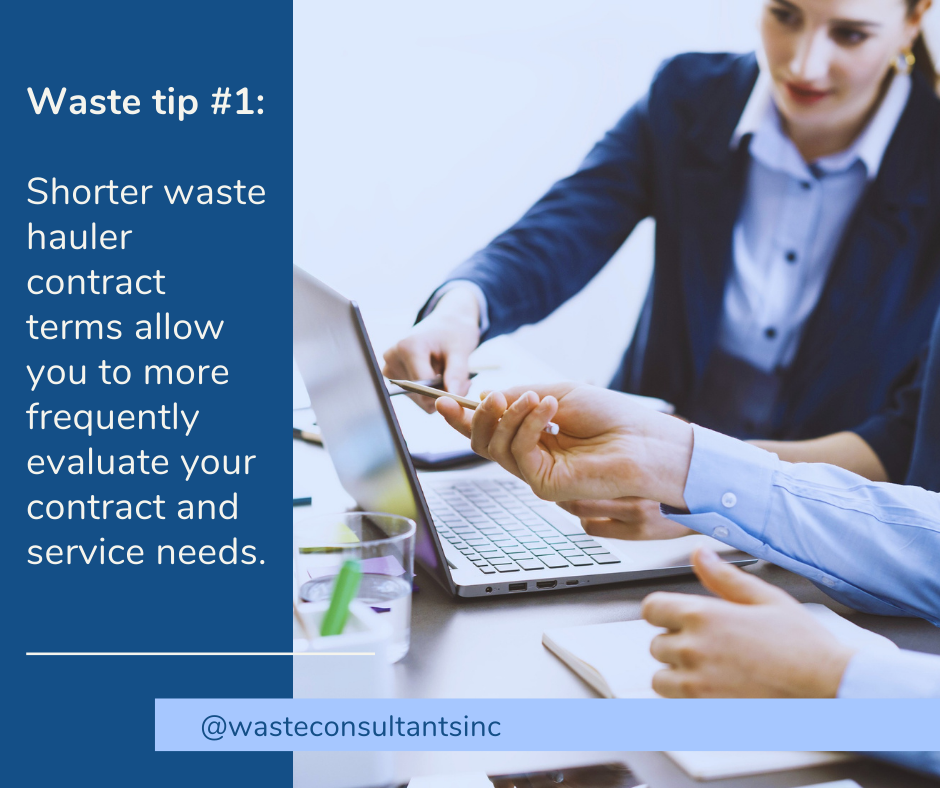
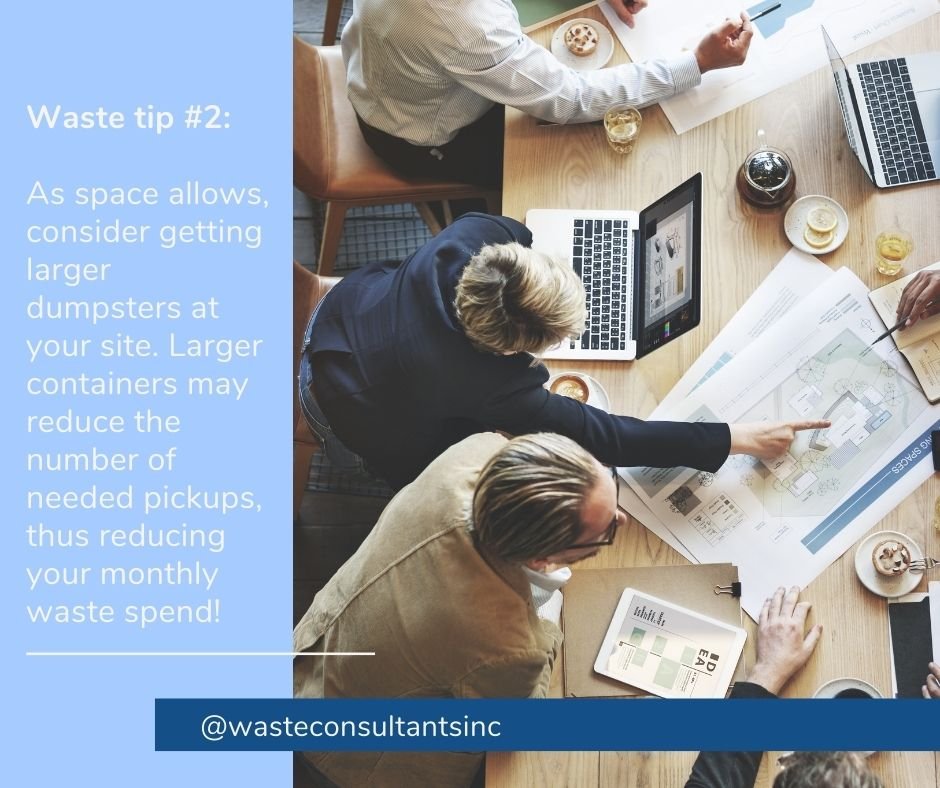
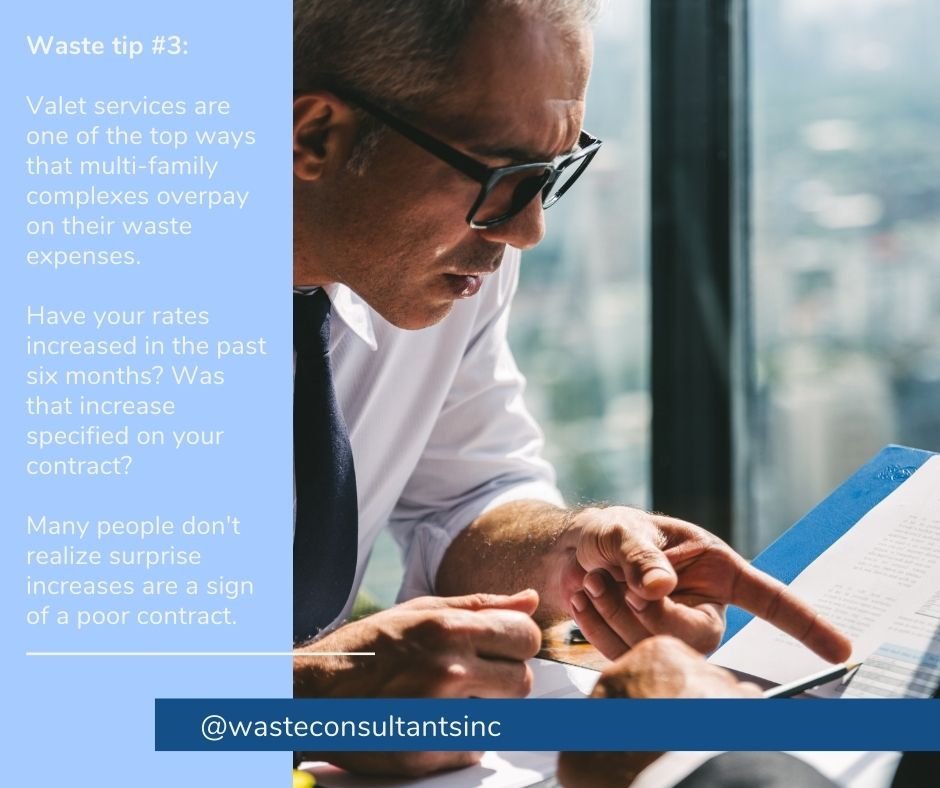
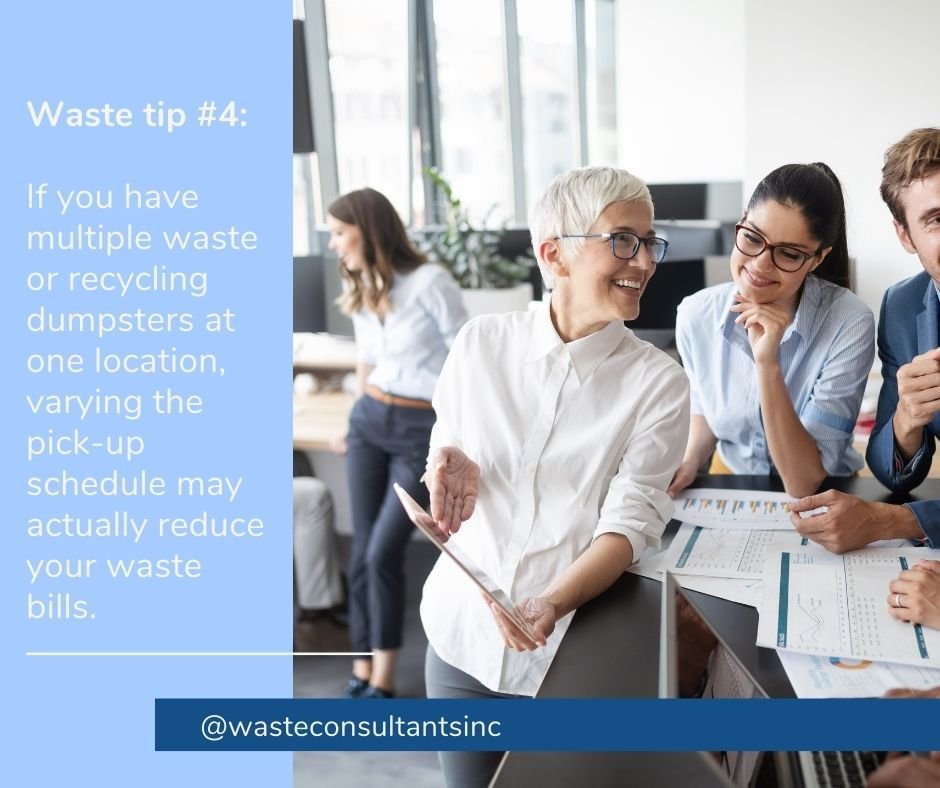
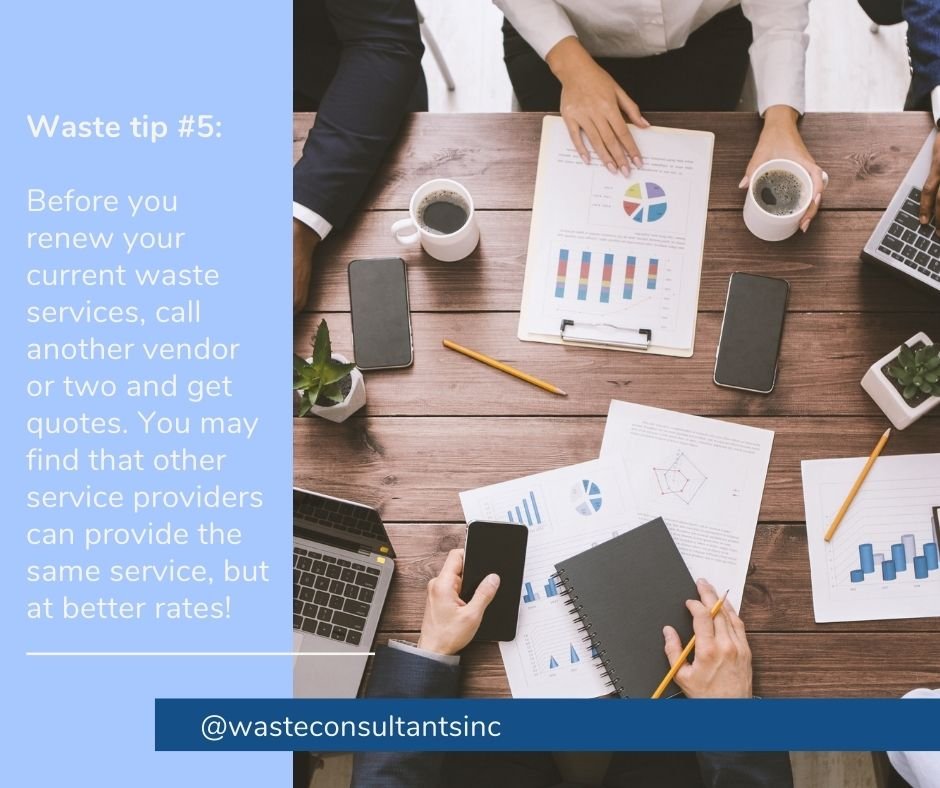
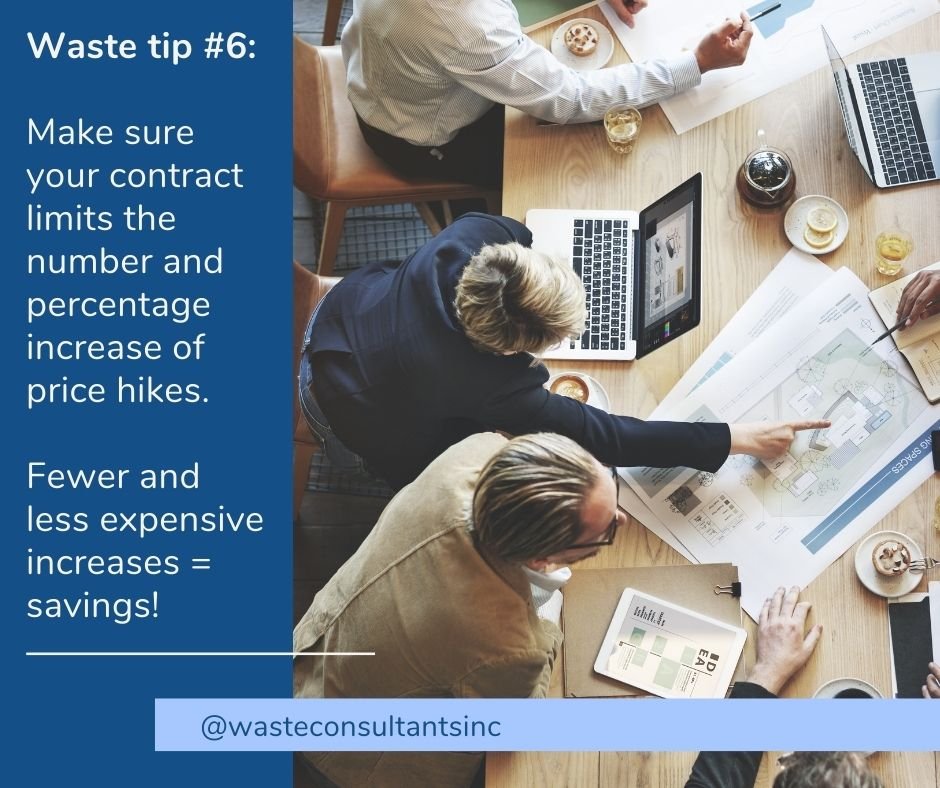
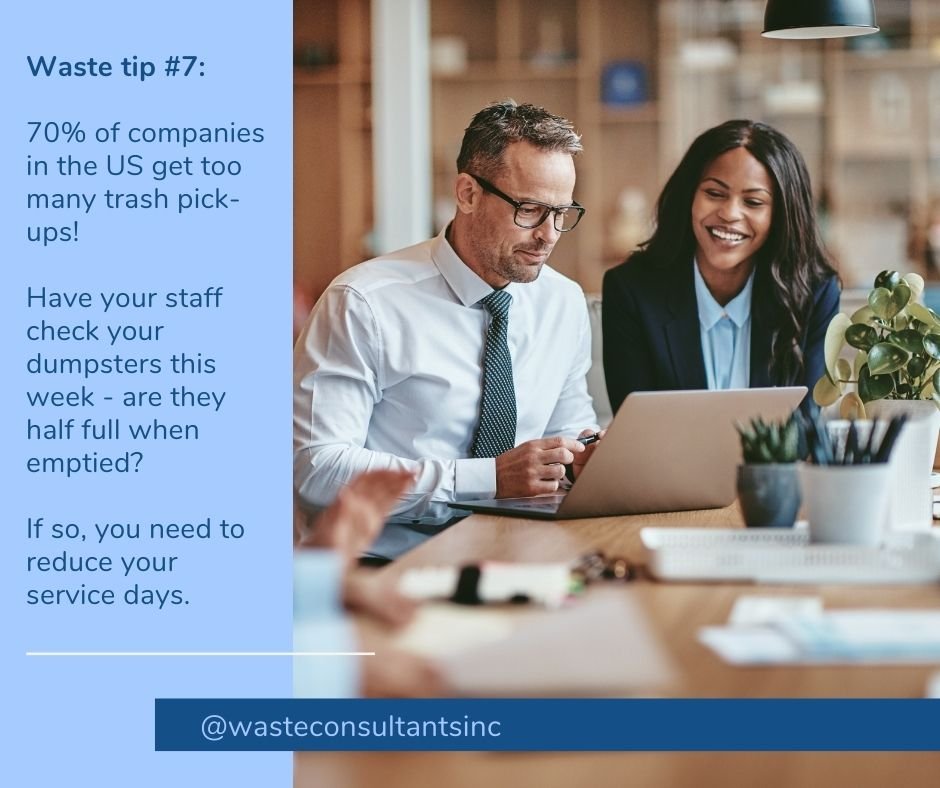
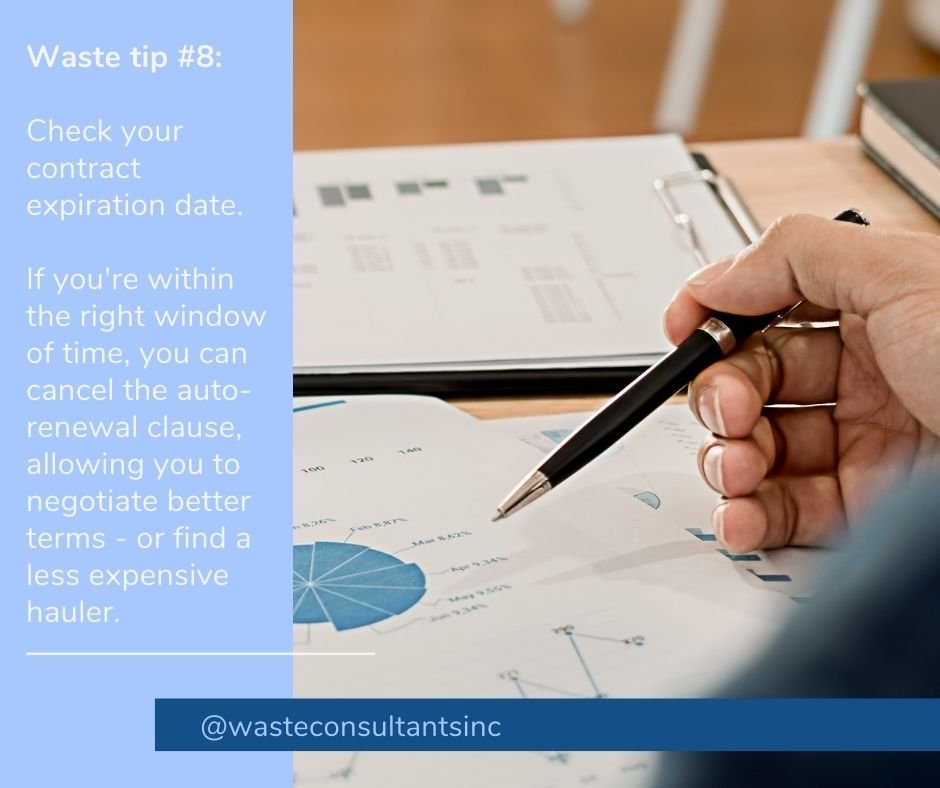
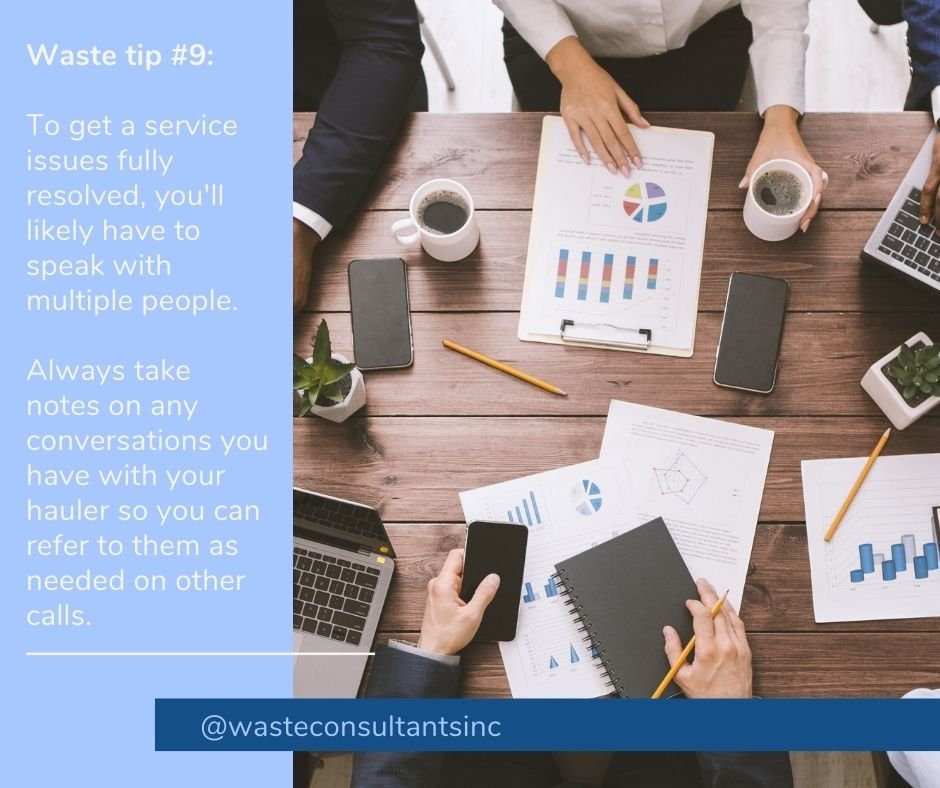
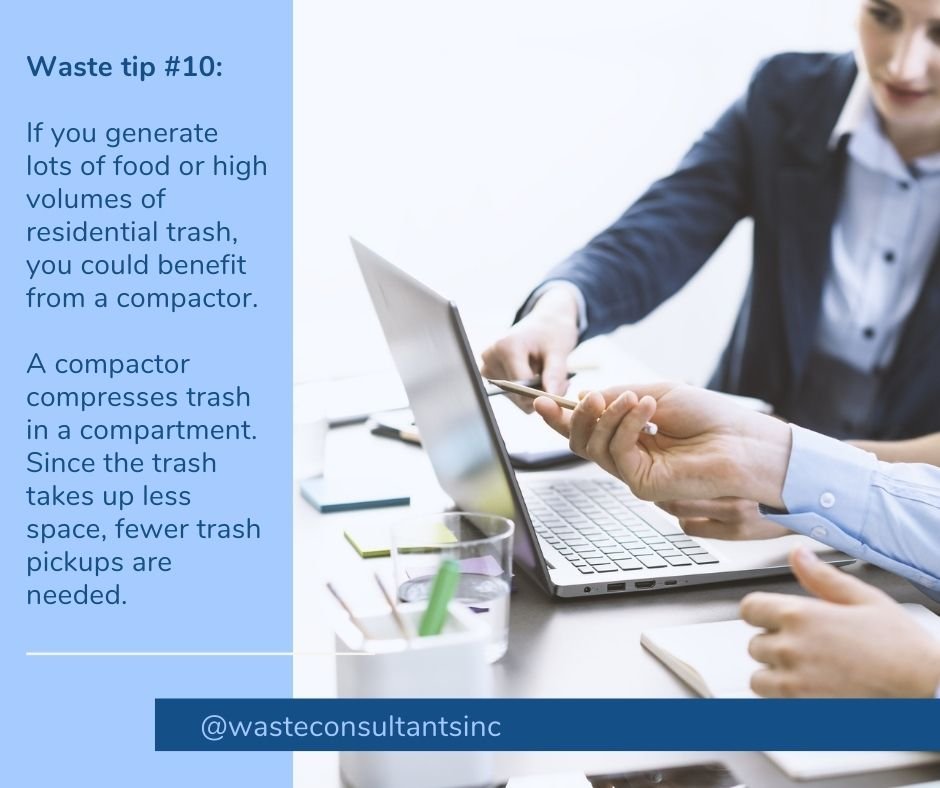
Real Talk on Utility Audits: Why Ours Work
Our audits work because they are strategic, savings-oriented, and safeguarded.
You can save on your utility and telecom expenses by getting a free audit. (We only bill after our cost-cutting solutions reduce your utility spend.) Our utility audits successfully find savings for 80% of our clients because they are thorough, savings-oriented, and safe guarded.
Below, we’ll go into detail about each of these categories.
Every audit we do is:
Strategic
Savings-oriented
Safeguarded
Thorough Utility and Telecom Audits
WCI’s audits are carefully calibrated to yield the maximum amount of savings opportunities for you and your company.
We are thorough: We examine your bills, your rate structures, and trends in your 12 month invoice history. We also look at tax exemptions, standard pricing options, and vendor options. We often find credits - take this manufacturing client for example.
This client, an auto parts manufacturer in North Carolina, partnered with us about two years ago. We scoured three years of invoices - and secured a refund of $82,720.41
They were paying a tax that they were excluded from due to their NAICS classification. And they had no idea!
We find recommendations that make the most sense for you and your company by examining all the options available to you given the market you are in. After we complete our review process, we provide recommendations to maximize your savings. We show you how to take advantage of cost-reduction opportunities - but we don’t stop there!
After we get your go-ahead, we set them up on your behalf and ensure all implementation goes smoothly. After that, you can start collecting on the savings!
Our Utility Audits are Savings-Oriented
Our audits are so thorough that they routinely find savings. Over the years, we’ve found how to find the unique savings opportunities that you’re sitting on.
Recently, we partnered with a mattress manufacturer. They had facilities in six states, and like the auto parts manufacturer above, they didn’t realize how much savings they were sitting on. We audited their utility and telecom expenses and were able to uncover significant savings opportunities by disconnecting outdated and unused phone lines and securing better pricing on their energy contracts.
We’re so confident that our audits will find savings opportunities for you that we don’t require payment until we’ve implemented cost-cutting measures. You don’t pay us until your savings appear on your invoices. It’s another way we try to protect your bottom line - we don’t believe you should pay for something that does not (or has yet to) benefit you.
Utility Audits Safeguards Your Savings
We don’t stop at simply finding savings; we ensure that those savings are protected.
We make sure vendors abide by any new changes that have taken place in your contract. After all, what’s the point of making cost-cutting changes to your utility management if those changes aren’t permanent? If your vendor agreed to standardized pricing, but then kept charging you at your old rate, that would quickly become a problem!
Our audit services are different from others because we monitor your utility and telecom invoices post-audit. When we find a discrepancy or error, we call the company and have any issues credited to you. So you can always rest easy knowing that your billing is accurate - and your savings are secure.



































